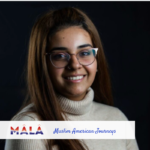Norina Zeb: Brown, Loud, and Proud
Norina shares the story of how she navigates and takes pride in her identity despite experiences with prejudice and persecution.
Identity is a concept that many of us find difficult to grasp. It is something that can be influenced by the way we grew up, the people we are surrounded by, or even the views that we have of ourselves. My identity is a Muslim Pakistani-American, and nothing can dent my confidence in being one. Although this is something that I knew I was from the start, it is not something that I understood and cherished until recently.
I grew up in Annandale, Virginia, and have lived here for nearly 20 years. Annandale is a generally Hispanic and East Asian community. Nonetheless, it is extremely diverse. Of course, there is always a handful of oddballs and rigid individuals that tend to strongly dislike a certain category of people, or people who do not have the same amount of melanin in their skin. This has been an issue with my identity growing up, and it is part of the reason I never really understood myself.
There have been countless times that I have been treated like I am “less” or not worthy of being spoken to. One time when I was around 10 years old, I was driving to the grocery store with my mom, and we saw a homeless lady on the road. Naturally, we stopped to hand her whatever change we could amass, to give to her. My mother and I were wearing our traditional Pakistani clothing since we had just returned from visiting some relatives. As we approached the lady, she scrunched up her face and spit. “GO BACK TO YOUR COUNTRY YOU DAMN MUSLIMS! WE DO NOT NEED YOU HERE”. She yells in our faces, as she grabs the money from us. This was utterly terrifying. It had been one of the earlier instances where I had been pushed away based on my religion. I wondered to myself, “why do people not like Muslims? Am I not as good as the other people that try to help out?”. After this instance, I was a little worried about both my mother and me, because I did not know what other harsh actions people were capable of.
My mother, in her recent years, began wearing Hijab. I was so inspired by her decision to make this change that I wanted to follow in her footsteps. In fifth grade, I wore it for a week. One day, my classmate pulled it off from my head and laughed in my face, ridiculing me for “covering my hair” when it was in the midst of summer. After that moment, I decided that I was not going to wear it again until I can really prove to people that I know, and am firm, in my faith and they can not take that away from me.
I have been attending an Islamic school since I was five. I finished memorizing the Quran four years ago, and I feel as though this really contributed to me understanding my identity and what it means to be a Muslim. My identity has evolved so much since I had first started attending. There have been many times where I felt ashamed to be Pakistani or tried to hide the fact that I am Muslim. I was afraid of being different from the other kids at school, eating different foods, coming home to different customs and traditions at home, looking different from the other kids; I was ashamed of what people would think of me when they see me kneeling down to sujood in the library for prayer, or what they would assume when they hear that I speak Arabic, especially after 9/11.
Of course, it took many years for me to accept that this is who I am. In the end, the kids that I was too busy worrying about will not even remember me ten years from now. The people that tell me I do not belong in this country, are just feeble-minded. What Islam is all about, is patience. Patience, understanding, and respect, are the three key aspects that sculpt me into who I am today. It gets hard when I am not treated the way I wish I was, but that does not stop me anymore. Walking in my cultural Pakistani clothes outside in public re-energizes me now; it lets the world know “hey, this is me and I am proud. I am different and amazingly, I am worth exactly the same as you.”
My identity has come a long way and I owe it all to everyone and everything around me. If I had not been treated as though I am different, I would probably never have realized it. Fitting in with the rest of the world is not what I want anymore. Now, I want to correct people when they ask me if I am Middle Eastern, I want to set a good example for Muslim’s around the world, and I want them to know that trying to damage someone’s self-esteem by making them feel unwanted is not going to work; they are only hurting their own reputation of themselves, and strengthening ours.


